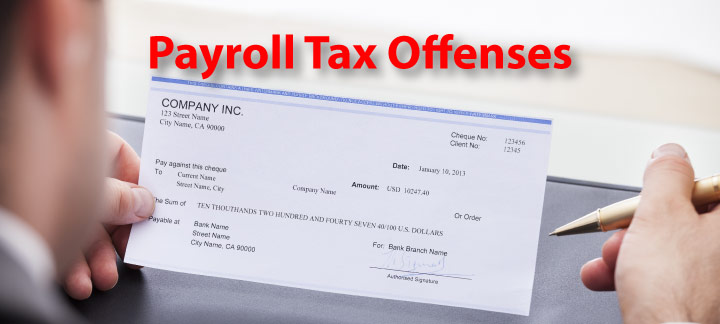Employment Withholding - Payroll Tax Offenses
Businesses are required to pay payroll taxes, which are computed and withheld from employees’ taxes. The employer is then required to turn over the withheld amounts to the IRS. Sometimes, however, the employer fails to turn over the withheld taxes to the IRS, instead using the payroll tax funds for operation costs and other purposes. Failure to properly remit withheld payroll taxes to the IRS can result in the assessment of significant civil and criminal penalties on the employer. The penalties are some of the toughest in the Internal Revenue Code and must be taken very seriously by all businesses.
Criminal Repercussions from Failing to Withhold and Remit Payroll Taxes
The IRS has put into place several criminal offenses to deal with employers’ failure to perform certain acts related to employment withholding taxes. In recent years, the IRS has also increased its efforts to punish those who violate withholding tax requirements, making knowledge and understanding of the criminal penalties associated with these violations even more important. The requirement to withhold and remit payroll taxes is set forth in Internal Revenue Code § 7202, which applies to employers who are “required to collect, account for, and pay over” withholding taxes for any tax imposed by the Code (1). Specifically, the following penalties might be levied upon employers, depending on the situation:
- Employers who willfully fail to collect or remit withholding tax may be subject to a felony charge with up to five years in prison, a $10,000 fine, or both (20.
- If an employer fails to provide an employee information about the amount of tax withheld, the employer may be punished with up to one year in prison, a fine of $1,000, or both.
Defenses Available to Employers for Failing to Withhold Employment Taxes
For some time, employers who failed to withhold employment taxes were able to successfully argue an inability to pay as a defense to the charge. Because the IRC section requires employers to “willfully” fail to collect or remit withholding tax to be subject to criminal IRS charges, the IRS must be able to establish that the employers’ failure to pay was a voluntary and intentional act (3). However, in recent cases, courts have rejected the “inability to pay” defense, but willfulness must still be established by the government (4). Thus, financial inability to pay withholding taxes may not be a viable defense by any employer who faces potential criminal liability for payroll tax violations.
How a Tax Attorney Can Help with Payroll Tax Withholding Violations
The Tax Lawyer - William D Hartsock Tax Attorney Inc. has been successfully helping employers comply with payroll tax withholding requirements since the early 1980s. If you, as an employer, have failed to properly comply with payroll tax withholding requirements, you may be subject to criminal penalties and monetary fines. Mr. Hartsock offers free consultations with the full benefit and protections of attorney client privilege to help people clearly understand their situation and options based on the circumstances of their case. To schedule your free consultation simply fill out the contact form found on this page, or call (858) 481-4844.
Tax Law References:
- IRC § 7202.
- IRC § 7202.
- United States v. Poll, 521 F2d 329, 333 (9th Cir. 1975).
- United States v. Easterday, 564 F3d 1004 (9th Cir. 2009).



Comments (0)